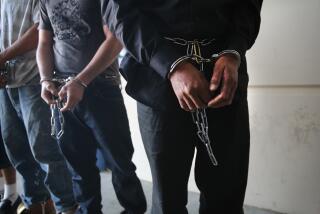Computers Helping U.S. Keep Track of Hostages
- Share via
WASHINGTON — State Department workers and volunteers closeted in a four-room communications center here are assembling computer profiles of the 3,000 American citizens in Kuwait and Iraq in an effort to monitor the Persian Gulf hostage crisis.
The profiles include information on each citizen’s believed whereabouts and living conditions, his or her health status and the names of relatives and friends back home, according to Nicholas Ricciuti, director of the Citizens Emergency Center.
With the data close at hand, the State Department workers hope to relay information to family members as it develops.
But Ricciuti said the Americans and their relatives are being cautioned not to mention an endangered citizen’s whereabouts in any overseas phone conversations because Iraqi officials are known to be monitoring many such calls.
“We’re advising Americans to keep a low profile,” he said.
The U.S. Embassy in Kuwait has used a “warden system,” sometimes referred to as a pyramid system, in which individual embassy officials have been assigned a limited number of persons to track, he said.
“Phone calls are short. They establish if the citizen is well and safe but advise them never to state their exact location because of monitoring by Iraq,” Ricciuti said. “The system has functioned very well in Kuwait.”
Some foreign embassies reportedly have assisted U.S. officials in locating Americans, but Ricciuti declined to discuss such efforts.
State Department spokesman Richard Boucher said the U.S. Embassy has sent back to Washington coded cables with names of Americans and the dates they were contacted, along with such notations as “he’s fine.”
“We then try to forward this to family members,” he said.
Asked if the department would pass along bad news as well, Boucher said, “We give them whatever we have.”
Ricciuti said his emergency center has operated 24 hours a day since the Iraqi invasion of Kuwait on Aug. 2. He has maintained three eight-hour shifts with up to 40 workers per shift, including trained volunteers.
A total of 25,000 phone calls have been received from relatives and friends, and each one has been recorded in the department’s computerized Crisis Information System, he said.
The system files inquiries under the name of the citizen trapped in Iraq or Kuwait, listing the name and phone number of the calling party, his or her relationship to the American abroad and any information he or she has about that person.
“We have responded by making 10,000 call-backs to families and concerned friends, both to reassure them and find out if they have had any contact with their relative overseas,” Ricciuti told reporters.
Special attention is being given to cases of Americans with diagnosed medical problems and those known to be in Iraqi custody, he said.
More to Read
Sign up for Essential California
The most important California stories and recommendations in your inbox every morning.
You may occasionally receive promotional content from the Los Angeles Times.










